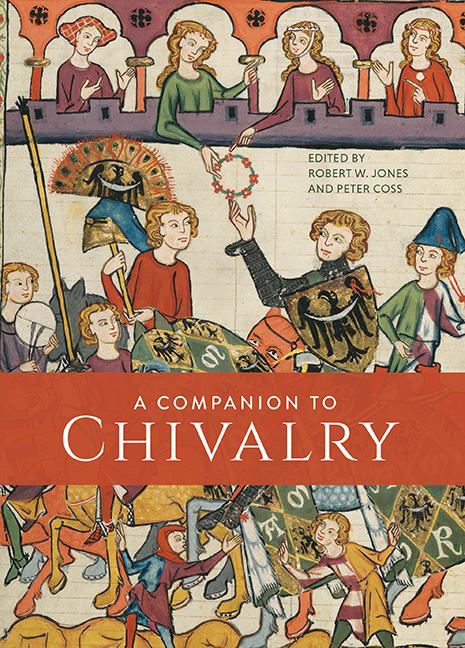Book contents
- Frontmatter
- Contents
- List of Illustrations
- List of Contributors
- Introduction
- 1 The Origins and Diffusion of Chivalry
- 2 The Organisation of Chivalric Society
- 3 The Secular Orders: Chivalry in the Service of the State
- 4 The Military Orders
- 5 Marshalling the Chivalric Elite for War
- 6 Chivalric Violence
- 7 Chivalry in the Tournament and Pas d'Armes
- 8 Heraldry and Heralds
- 9 Arms and Armour
- 10 Constructing Chivalric Landscapes: Aristocratic Spaces Between Image and Reality
- 11 Gendered Chivalry
- 12 Chivalric Literature
- 13 Manuals of Warfare and Chivalry
- 14 The End of Chivalry? Survivals and Revivals of the Tudor Age
- 15 Chivalric Medievalism
- Select Bibliography
- Acknowledgements
- Index
Introduction
Published online by Cambridge University Press: 24 October 2019
- Frontmatter
- Contents
- List of Illustrations
- List of Contributors
- Introduction
- 1 The Origins and Diffusion of Chivalry
- 2 The Organisation of Chivalric Society
- 3 The Secular Orders: Chivalry in the Service of the State
- 4 The Military Orders
- 5 Marshalling the Chivalric Elite for War
- 6 Chivalric Violence
- 7 Chivalry in the Tournament and Pas d'Armes
- 8 Heraldry and Heralds
- 9 Arms and Armour
- 10 Constructing Chivalric Landscapes: Aristocratic Spaces Between Image and Reality
- 11 Gendered Chivalry
- 12 Chivalric Literature
- 13 Manuals of Warfare and Chivalry
- 14 The End of Chivalry? Survivals and Revivals of the Tudor Age
- 15 Chivalric Medievalism
- Select Bibliography
- Acknowledgements
- Index
Summary
Chivalry is still present in our language and culture, if residually. Most people would probably understand it today in terms of courtesy and generosity towards others, especially (if controversially and sometimes ironically) when it comes to male behaviour towards women. At the same time, for many it continues to evoke a past world of valiant knights fighting for a just cause and obeying the moral strictures of their calling that centred on what we would tend to call fair play. These perceptions have a degree of validity.
As soon as one delves more deeply into the medieval world, however, it becomes readily apparent that chivalry was more complex and multi–faceted. Scholars exploring the meaning and historicity of chivalry find themselves confronting a socio–cultural phenomenon that was heavily nuanced and that had many, sometimes rival, dimensions. What, they tend to ask themselves, lay at its core and what was contingent? Did it indeed have a single essence? In attempting to answer these and similar questions historians have adopted a wide variety of approaches. The aim of this book is to explore these, not only to provide a synopsis of the scholarship but also to suggest new insights and new lines of inquiry. Accordingly, each scholar has been asked to draw on their own area(s) of expertise and to offer their own particular take on the subject.
Peter Coss opens the volume with a critical review of Anglophone and Francophone historiography of the origins and meaning of chivalry, showing where the various viewpoints differ and interconnect. He then examines the maturation of chivalry in the late twelfth and early thirteenth centuries and the processes involved in its social and geographical diffusion. A process of crystallisation led to the creation of a chivalric community that shared as its core values of martial prowess, personal honour and entitled independence. The control or harnessing of this aggressive independence is a recurring theme through many of the chapters of this work. David Simpkin investigates the desire of the monarchs of Europe to direct the activities of the chivalric elite for war and government, arguing that, for the most part, that elite was cooperative and constructive.
- Type
- Chapter
- Information
- A Companion to Chivalry , pp. 1 - 6Publisher: Boydell & BrewerPrint publication year: 2019



